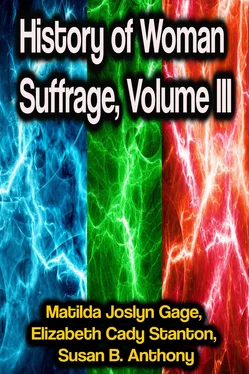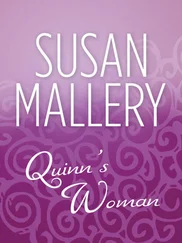That we all, as women who love our country and our kind, may be led to honor each other in our personal relations, while we work each in her respective way for that higher order of manhood and womanhood that alone can exalt our nation to the ideal of the fathers and mothers of the early republic, and preserve us an honored place among the peoples of the earth, is the prayer of
Isabella Beecher Hooker.
Yours sincerely,
Evidently left without even the name of Mrs. Sherman or the Anti-Suffrage Society to sustain her, Mrs. Dahlgren memorialized the Senate Committee on Privileges and Elections against the submission of the sixteenth amendment:
To the Honorable Committee on Privileges and Elections:
Gentlemen—Allow me, in courtesy, as a petitioner, to present one or two considerations regarding a sixteenth amendment, by which it is proposed to confer the right of suffrage upon the women of the United States. I ask this favor also in the interests of the masses of silent women, whose silence does not give consent, but who, in most modest earnestness, deprecate having the political life forced upon them.
This grave question is not one of simple expediency or the reverse; it might properly be held, were this the case, as a legitimate subject for agitation. Our reasons of dissent to this dangerous inroad upon all precedent, lie deeper and strike higher. They are based upon that which in all Christian nations must be recognized as the higher law, the fundamental law upon which Christian society in its very construction must rest; and that law, as defined by the Almighty, is immutable. Through it the women of this Christian land, as mothers, wives, sisters, daughters, have distinct duties to perform of the most complex order, yet of the very highest and most sacred nature.
If in addition to all these responsibilities, others, appertaining to the domain assigned to men, are allotted to us, we shall be made the victims of an oppression not intended by a kind and wise Providence, and from which the refining influences of Christian civilization have emancipated us. We have but to look at the condition of our Indian sister, upon whose bended back the heavy pack is laid by her lord and master; who treads in subjection the beaten pathway of equal rights, and compare her situation with our own, to thank the God of Christian nations who has placed us above that plane, where right is might, and might is tyranny. We cannot without prayer and protest see our cherished privileges endangered, and have granted us only in exchange the so-called equal rights. We need more, and we claim, through our physical weakness and your courtesy as Christian gentlemen, that protection which we need for the proper discharge of those sacred and inalienable functions and rights conferred upon us by God. To these the vote, which is not a natural right (otherwise why not confer it upon idiots, lunatics, and adult boys) would be adverse.
When women ask for a distinct political life, a separate vote, they forget or they willfully ignore the higher law, whose logic may be thus condensed: Marriage is a sacred unity. The family, through it, is the foundation of the State. Each family is represented by its head, just as the State ultimately finds the same unity, through a series of representations. Out of this come peace, concord, proper representation, and adjustment—union.
The new doctrine, which is illusive, may be thus defined: Marriage is a mere compact, and means diversity. Each family, therefore, must have a separate individual representation, out of which arises diversity or division, and discord is the corner-stone of the State.
Gentlemen, we cannot displace the corner-stone without destruction to the edifice itself! The subject is so vast, has so many side issues, that a volume might as readily be laid before your honorable committee as these few words hastily written with an aching woman's heart. Personally, if any woman in this vast land has a grievance by not having a vote, I may claim that grievance to be mine. With father, brother, husband, son, taken away by death, I stand utterly alone, with minor children to educate and considerable property interests to guard. But I would deem it unpatriotic to ask for a general law which must prove disastrous to my country, in order to meet that exceptional position in which, by the adorable will of God, I am placed. I prefer, indeed, to trust to that moral influence over men which intelligence never fails to exercise, and which is really more potent in the management of business affairs than the direct vote. In this I am doubtless as old-fashioned as were our grandmothers, who assisted to mold this vast republic. They knew that the greatest good for the greatest number was the only safe legislative law, and that to it all exceptional cases must submit.
Gentlemen, in conclusion, a sophism in legislation is not a mere abstraction; it must speedily bear fruit in material results of the most disastrous nature, and I implore your honorable committee, in behalf of our common country, not to open a Pandora's box by way of experiment from whence so much evil must issue, and which once opened may never again be closed.
Madeleine Vinton Dahlgren.
Very respectfully,
Mrs. Dahlgren was ably reviewed by Virginia L. Minor of St. Louis, and the Toledo Woman Suffrage Association. Mrs. Minor said:
In assuming to speak for the "silent masses" of women, Mrs. Dahlgren declares that silence does not give consent; very inconsequently forgetting, that if it does not on one side of the question, it may not on the other, and that she may no more represent them than do we.
The Toledo society, through its president Mrs. Rose L. Segur, said:
We agree with you that this grave question is not one of expediency. It is simply one of right and justice, and therefore a most legitimate subject for agitation. As a moral force woman must have a voice in the government, or partial and unjust legislation is the result from which arise the evils consequent upon a government based upon the enslavement of half its citizens.
To this Mrs. Dahlgren replied briefly, charging the ladies with incapacity to comprehend her.
The week following the convention a hearing was granted by the House Judiciary Committee to Dr. Mary Walker of Washington, Mary A. Tillotson of New Jersey and Mrs. N. Cromwell of Arkansas, urging a report in favor of woman's enfranchisement. On January 28, the House sub-committee on territories granted a hearing to Dr. Mary Walker and Sara Andrews Spencer, in opposition to the bill proposing the disfranchisement of the women of Utah as a means of suppressing polygamy.
On January 30 the House Judiciary Committee granted Mrs. Hooker a hearing. Of the eleven members of the committee nearly all were present.[32] The room and all the corridors leading to it were crowded with men and women eager to hear Mrs. Hooker's speech. At the close of the two hours occupied in its delivery, Chairman Knott thanked her in the name of the committee for her able argument.
Immediately after this hearing Mr. Frye of Maine, in presenting in the House of Representatives the petitions of 30,000 persons asking the right of women to vote upon the question of temperance, referred in a very complimentary manner to Mrs. Hooker's argument, to which he had just listened. Upon this prayer a hearing was granted to the president and ex-president of the Woman's Christian Temperance Union, Frances E. Willard and Annie E. Wittenmyer.
Hon. George F. Hoar of Massachusetts, February 4, presented in the Senate the 120 petitions with their 6,261 signatures, which, by special request of its officers, had been returned to the headquarters of the American Association, in Boston. In her appeal to the friends to circulate the petitions, both State and national, Lucy Stone, chairman of its executive committee, said:
Читать дальше












